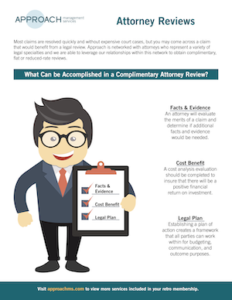This week’s Ask Approach is from guest blogger Jennifer L. Truong, an attorney with Reinisch Wilson Weier PC in the firm’s Washington practice.
You have likely been inundated with advertisements on radio and television which encourage injured workers to contact an attorney.
But, who is looking out for the employer? In Washington state, the benefit of the doubt goes to workers, not employers, so it’s an important question.
Approach clients have their Retro Coordinator to advocate for them, but there are times when adding the support of an attorney to your claims team could be helpful or even necessary.
Although outcomes can always vary, see if the following scenarios are similar to your experiences.
A claims has higher stakes right from the start
When an employer retained an attorney early on after a 62-year-old male worker with a singular work history sustained a shoulder injury, the attorney was able to:
- Secure pre-existing chart notes and an independent medical opinion,
- File a protest and successfully segregated need for surgical intervention as related to the industrial injury,
- Document non-cooperation after the claimant failed to appear multiple times for the conservative recommended treatment.
In the end, the claim was closed, which avoided significant costs associated with surgery, rehabilitation and the anticipated vocational barriers. A strong legal defense attorney behind the scenes can complement your retro coordinator’s efforts.
Remember: Even if a worker has a valid claim, it does not mean an employer is obligated to agree to all treatment and provide endless benefits.
A knowledgeable and experienced attorney can help identify opportunities to gather medical history and expert opinions that dispute recommendations for medical imaging, extensive treatment, time loss, loss of earning power, vocational determinations as well as a permanent and/or partial disability award.
A workplace accident leads to audits or inspections
The transportation and construction industries are particularly open to follow-up actions after a Report of Injury is filed with the Department of Labor and Industries:
Potential follow-up enforcement after a claim
- Transportation: A common occurrence within the trucking industry is that the report of injury triggers an audit by the Department, which may determine that the employer failed to open an account to pay industrial premiums with the assumption they had hired an independent contractor.
- Construction: A work injury on a construction site may trigger an inspection by the Department of Occupational Safety and Health (DOSH), leading to issuance of citations under the Washington Industrial Health and Safety Act (WISHA).
An employer who is facing multiple inquiries by the Department could benefit from retaining legal counsel to ensure aspects of the employer’s internal investigation is protected yet responses to the Department are clear and consistent.

You find yourself, as an employer, before “the Board”
Employers normally find themselves at “the Board,” otherwise known as the Board of Industrial Insurance Appeals (BIIA), when a worker appeals an unfavourable order issued by the Department of Labor and Industries. Employers can also appeal and, either way, an Industrial Appeals Judge will be assigned to conduct hearings, in which the Washington rules of evidence and Washington rules of civil procedure are applicable.
Even though you purchase your company’s workers’ comp insurance through L&I, the AAG that appears is representing L&I, not your company.
If you’re a Retro participant, which means your workers’ compensation insurance is issued through L&I, an Assistant Attorney General (AAG) will appear on behalf of L&I to defend the order on appeal. Many employers assume that the AAG is representing them in their defence. That isn’t the case!
That’s right! Here are two ways this can impact your company:
Be careful at the Board
- Knowing that the AAG is representing L&I, a savvy worker’s counsel may persuade the AAG to reverse the order or seek a settlement agreement unfavourable to the employer. Engaging counsel before the Board hearing is crucial for having someone who understands the court rules and adverse counsel tactics.
- Even when an AAG is aligned with the employer, the AAG may be limited by the information in the file. An attorney can help gain extensions that allow more evidence to be introduced.
As an example of the second point, an attorney was retained by an employer who was at risk of having claim closure reversed with a new cervical condition added on the claim. As an independent counsel, the attorney worked with the AAG and secured an extension of the discovery period and continuance of the hearing. They identified motor vehicle accidents pre- and post-industrial injury, not previously disclosed by the worker to anyone, which impacted the trajectory of defense options.
Conclusion
Maybe you haven’t experienced these scenarios…yet.
The best defense for workers’ compensation claims, in order to lower industrial premiums and lessen the opportunity for safety violations and audits, is to develop a safety program that reduces workplace injuries and occupational exposure to illnesses. However, there is value in consulting with your retro coordinator to assess risk and financial exposure early on to determine whether a workers’ compensation attorney can assist in mitigating costs.
Please do not hesitate to contact Jennifer with any questions. She can be contacted at jennifert@rwwcomplaw.com or at (206) 307-8869.

